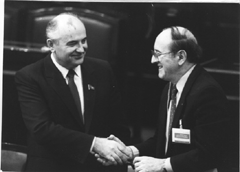I have good news to report. My grandfather, who was battling a host of maladies, is now on the mend. Once again he is brimming with innovative ideas and is as energetic as ever. Our posts will resume soon!
Last week, the European Heart Journal published a nice tribute to him and mentioned our blog! The article was written by one of my grandfather’s students in the UK, Dr. Amitava Banerjee.* As a layperson, I found a good deal of the article to be ‘medical speak,’ but I was excited about the shout-out.
Here are a few highlights from the article, as well as some additional facts that I learned from numerous conversations with my grandfather over the years:
- His earliest discovery (1951) related to the common mineral potassium. He found that when the blood concentration of potassium is diminished, the heart is more prone to dangerous irregularities in rhythm. With low potassium concentrations, numerous pharmaceuticals, especially digitalis drugs may provoke serious toxic reactions.
- Working with the great clinician and pioneer cardiologist, Samuel A. Levine, at the then Peter Bent Brigham Hospital, now Brigham and Women’s Hospital in Boston, together, they revolutionized the treatment of acute heart attack patients. Instead of keeping patients on complete bed rest for 4 to 6 weeks, immediately upon hospital admission, they placed patients in a comfortable armchair. The ‘chair treatment’ as it was called, markedly shortened hospitalization and substantially reduced mortality. My grandfather maintains that this change in managing acute heart attack (acute coronary thrombosis or acute myocardial infraction in medical parlance) resulted in more lives saved than all his other medical contributions combined.
- Together, with coworkers, he developed the widely used direct current defibrillator and cardioverter. These instruments restore a heart beat to the arrested heart and correct various rhythm disorders, like atrial fibrillation.
- Additional points from Dr. Banerjee:
“Dr. Lown has long championed holistic treatment of individuals in health and disease.
“He established SatelLife in 1987, to use inter-networking technology to disseminate [medical] knowledge, long before the world took note of the burden of non-communicable diseases in low-income countries.
“He founded ProCor in 1997 to encourage global dialogue regarding cardiovascular research and practice.”
- His greatest accolade was the Nobel Peace Prize (1985). He shared the Prize with the distinguished Soviet cardiologist, Dr. Evegeny Chazov, on behalf of the International Physicians to Prevent Nuclear War (IPPNW), the group that they co-founded.
- Banerjee also calls attention to my grandfather’s essay on climate change in his personal blog, a piece that was recently profiled in the Huffington Post.
- I am especially pleased by this reference: “’The Lown Conversation’ is a blog he started with his granddaughter, a communications professional, as an inter-generational dialogue to highlight and tackle problems in American and global healthcare.”
- Banerjee’s final sentence: “There can be no question that the world needs more cardiologists like Bernard Lown… This wise nonagenarian’s effortless navigation between clinical cardiology, social activism, teaching, and public communication of science leaves one breathless.”
*European Heart Journal, Volume 34 Issue 18, May 7, 2013
Copyright © 2012 The Lown Conversation



